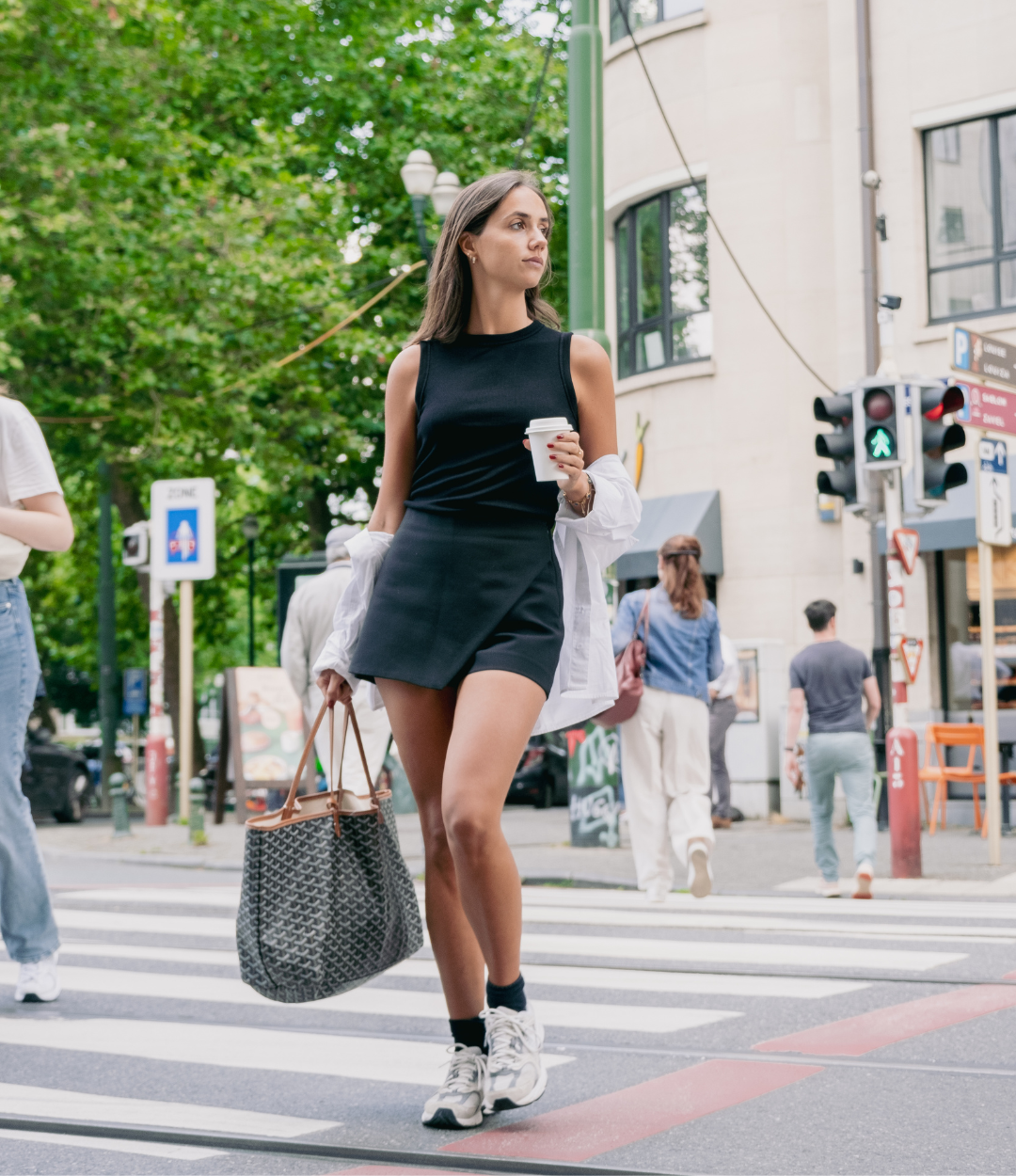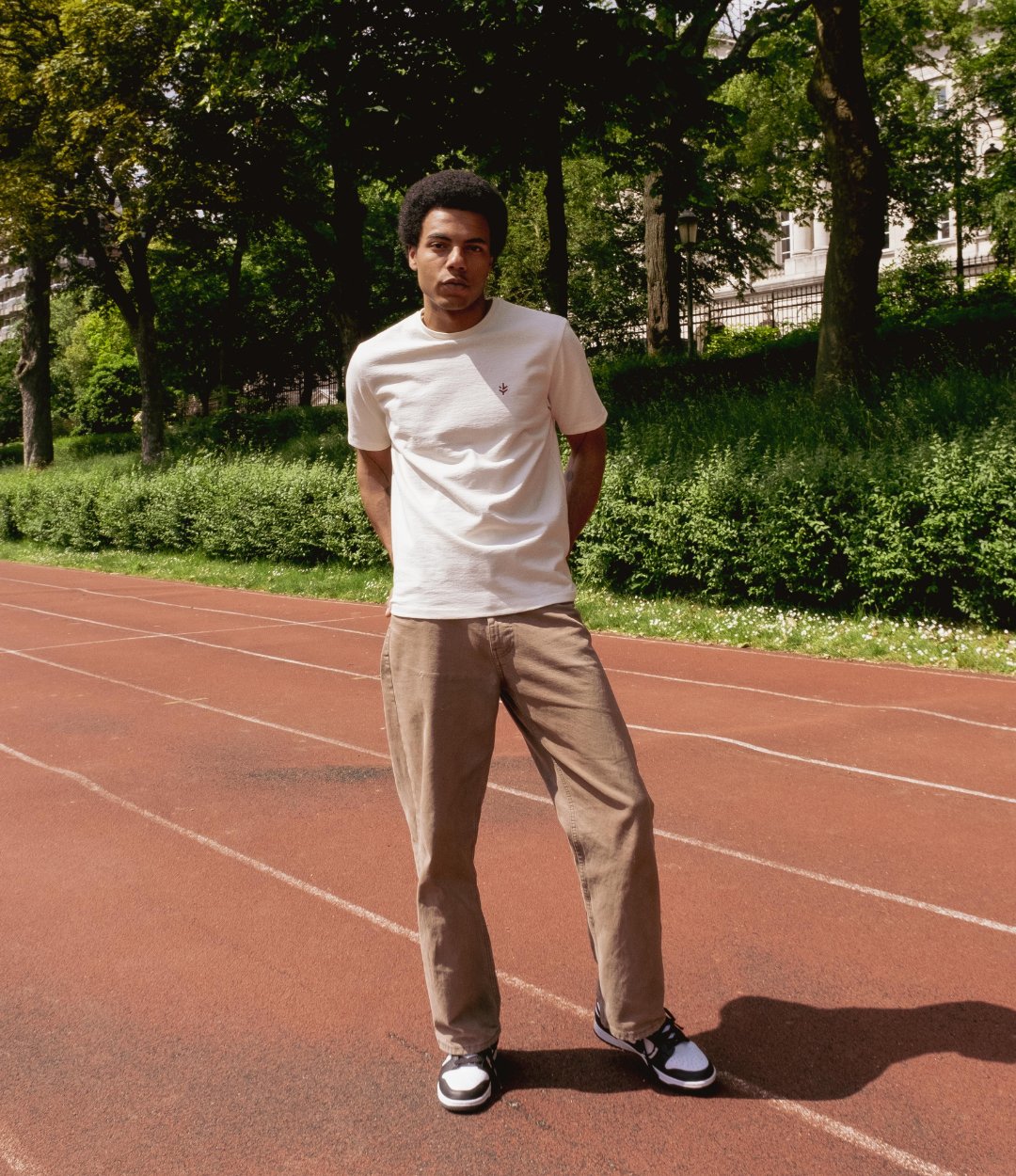Made in Belgium is a term you've often seen on chocolate or beer, but probably never on clothing. Or maybe not often enough. And yet, Belgian fashion is full of gems to wear, not just to eat! Between renowned Belgian couturiers and promising young Belgian designers, the flat country focuses on quality, unique creations, and a true sense of responsibility .
And because unity is strength (did you know that's Belgium's motto?), we've compiled the best of sustainable and ethical Belgian clothing brands, so everyone can dress while supporting the local economy.
Top 10 Belgian fashion brands
Among our national gems, we find:
1. Lucid Collective
Lucid Collective is a young Belgian brand that (really) makes its clothes in Belgium , in adapted work and social reintegration workshops . They offer clothes made from recycled materials (cotton, wool) or with very low impact such as linen and favor the know-how and artisanal quality of their local workshops. By focusing on a sober and timeless aesthetic , they hope to convince as many people as possible that buying made in Belgium means buying clothes that will last over time . Why make it complicated when you can make it simple?
2. Jacmin style
Founded by Alexandra and Ségolène Jacmin, two Belgian twin sisters passionate about fashion and architecture, Façon Jacmin offers unique creations while being careful to better select its textiles . Each piece combines contemporary creativity, artisanal know-how and environmental awareness , thanks to upcycling, European production and timeless collections.
3. FAM The Label
FAM offers a feminine wardrobe of natural elegance, with limited collections that favor eco-responsible materials like Tencel or organic cotton . Behind this Belgian brand lies a desire to slow down fashion, by promoting thoughtful consumption, without sacrificing style.
4. Howlin'
Specializing in handcrafted knitwear, Howlin' (which means "smelling" in Scottish dialect) promotes traditional knitting techniques, inherited from Scotland and Ireland . Each piece is designed to last, and some of them are even made in Belgium.
5. Meson
Annabelle and Thaïs invite you to the meson: they recover household textiles destined to be thrown away to make sustainable clothing, made in Belgium . Each capsule collection is composed of unique creations made with textiles from a specific room in the house. Example: a bucket hat made from bath towels. Personally, we love it.
6. Se-em
Designer Charlotte's goal is to upcycle as many unused or soon-to-be-disposed textiles as possible. With small collections and true expertise (Charlotte is a graduate of La Cambre), Sé-em offers something well-thought-out.
7. AMA Studio
This top's original proposition: made-to-order clothing. Based in Ghent, Studio AMA transforms surplus textiles from the local industry into unique pieces, crafted in social workshops in Flanders. So yes, it's mainly aimed at those with patience. But it's a good way to develop minimalist fashion and avoid overstocking.
8. HNST Jeans
In Antwerp, HNST (pronounced "honest") is revolutionizing local denim with recycled and sustainable materials. Using recycled cotton and innovative manufacturing techniques, the brand traces every step of production to minimize waste, emissions, and water consumption. Production is European.
9. Valalab
Similar to Méson, Valalab recycles your home textiles to create colorful gems . Lara makes each piece by hand in Brussels and even gives sewing workshops on occasion. We're talking about quality craftsmanship, made in Belgium!
10. Nu Oceans
The only shoe entry in our top picks, Nu Oceans is revolutionizing the sandal world. Founded by Belgian Hadrien, this young brand incorporates recycled flip-flops that polluted the world's beaches to create ultra-comfortable, durable, and ethical sandals.
Why choose Belgian and sustainable clothing?
Belgium is often overshadowed by its neighbors (like in the 2018 World Cup, yes, the seum is still present) and yet, the flat country possesses an unsuspected creative wealth. From Ghent to Antwerp, creators have redefined the rules of the game since the 80s , merging audacity and tradition.
Today, a breath of fresh air is blowing through Belgian fashion: ethical, local fashion that aims to challenge production standards. Let us explain what makes Belgian fashion unique and why it's high time we gave it the recognition it deserves.
If you can't be bothered to read everything
- 🌍 Belgium is a major player in fashion, with avant-garde designers like the "Antwerp Six" and contemporary talents driving innovation.
- 👗 Belgian designers combine boldness and craftsmanship to offer original and sustainable fashion.
- ♻️ Belgian fashion prioritizes recycled materials, local production, and transparency. Brands like Lucid Collective, Façon Jacmin, and HNST are redefining the standards.
- 🏙️ Producing in Belgium supports the local economy, preserves jobs and reduces environmental impact thanks to short supply chains.
- 🔄 A 100% recycled Belgian brand, made locally, with a timeless aesthetic, which is part of a "slow fashion" approach.
How does Belgian fashion stand out internationally?
When we talk about fashion, we often think of fashion week, cities like Paris, Milan, or New York. Belgium isn't necessarily the first country that comes to mind, and yet!
Since the Middle Ages, cities like Ghent and Bruges have stood out for their textile expertise , particularly in lace. But it was especially in the 1980s, with the arrival of the famous "Antwerp Six" that Belgium shone on the international fashion scene . Trained at the Royal Academy of Fine Arts, designers like Dries Van Noten , Ann Demeulemeester and Martin Margiela imposed an avant-garde aesthetic combining conceptual rigor and attention to detail.
We also make our sweaters from 100% recycled wool in the same place as some of Dries Van Noten 's pieces, in our Flemish workshop. Classy (for him).
Today, the country continues to innovate with talents like Raf Simons, Marine Serre and Glenn Martens, and with a solid ecosystem: cutting-edge boutique galleries, trade shows (like Mode-Belge) and quality local production.
The result: Belgium stands out as a creative laboratory where experimentation, sustainability, and craftsmanship coexist, thus occupying a unique and respected place in the fashion world. This is thanks to the government's "Textil Plan" (1982-1985), which relaunched the Belgian textile industry through innovation. By supporting young talent, it propelled the Antwerp Six to the forefront.

What is Belgian fashion?
Besides a few brands with growing international renown (whose names we will not mention here), Belgian fashion is above all a multitude of designers and collectives who are working to revive (or resurrect) the textile industry that was once the pride of the kingdom.
Far from large factories, Belgian fashion relies on family workshops and small factories : weaving mills in Flanders, knitwear workshops in Kortrijk, and adapted workshops in Hainaut. This allows designers to experiment quickly while ensuring decent working conditions, superior quality, and support for the local economy.
That's precisely why at Lucid, we produce our clothes in adapted work workshops in Hainaut, in a social reintegration workshop in Brussels and in a family workshop in Flanders . We want to be able to ensure who makes our clothes and how they are made. Needless to say, we know the first names of all the workers who make our clothes.

How do these brands participate in the local economy?
Did you know that more than 90% of the clothes we Europeans consume are imported from countries outside of Europe ? And yes, look at the label on your jeans, there's a good chance they're " Made in far from home ." And when you know that it was only 30% in the early 2000s , it's chilling.
You might wonder what the problem is. In fact, the further away the garment comes from, the greater the lack of transparency about its production conditions . And that's where big brands take advantage to reduce their costs as much as possible (and maximize their profits) by imposing disastrous working conditions on their workers and opting for ultra-polluting materials . Fast fashion, your ruthless universe.
The Belgian brands in the top 10 we've featured are among the growing number of brands that have decided to choose local and sustainable products to ensure the conditions under which their clothing is made.
Recycled and low-impact materials, total transparency on manufacturing, positive social impact, short supply chains: today, buying made in Belgium means choosing conscious consumption and responsible fashion that is less disruptive to the planet and supports the local economy.
The impact on the local economy? Producing locally keeps factories running, maintains skilled jobs, and injects value directly into our neighborhoods. Short supply chains, less transportation, more resilience: every garment created here nourishes an ecosystem where artisans, suppliers, and local businesses thrive together.
Not to mention the more controlled working conditions and wages that ensure a much higher level of ethics behind the manufacturing process . And it's still nice to know that the people who make our clothes can go home at decent hours and have enough to live decently with their families rather than being exploited.
A concrete example from us, where we detail this entire virtuous circle in the “ Supporting the local economy ” section of our Our Manufacturers page.
Belgian fashion brands are waking up
But the good news is that awareness is rising. More and more consumers are questioning the current textile industry model, seeking to understand what's really behind the label, and making choices that are more aligned with their values.
We feel it at Lucid, there are more and more of you coming to challenge the textile industry with us.
Faced with growing awareness, more and more brands are deciding to do things differently . No more vague promises: make way for transparency, ethics and responsible creativity . These brands are committed on all fronts: choice of sustainable materials ( recycled cotton , organic cotton, linen , recycled wool , Tencel , recycled polyester ), local or European production, certifications, more modest production models, etc.
At Lucid Collective we want to prove that we can create clothes without creating problems and above all that it should be accessible to buy quality clothes without compromising our values and being certain of the conditions in which they were made .
We want to challenge the textile industry and show them what we're made of. Don't hesitate to take a look at our project or our clothes .
Sources:
I buy Belgian. (nd). “Women’s fashion / clothing” directory . I buy Belgian. Retrieved from https://jachetebelge.be/fr/marques-belges?cat%5B0%5D=mode-mode-femme-vetements
Ecoconso. (nd). Where to buy eco-friendly clothing or textiles in Belgium? . Ecoconso. Retrieved from https://www.ecoconso.be/fr/content/ou-acheter-des-vetements-ou-textiles-ecologiques-en-belgique
Belgien.net. (nd). Fashion and design in Belgium . Belgien.net. Retrieved from https://belgien.net/fr/mode-et-design/
Madame Figaro. (2015). Belgium, a fashionable story . Madame Figaro. Retrieved from https://madame.lefigaro.fr/style/la-belgique-une-histoire-a-la-mode-050615-96860
Belgae. (nd). History and chronology of Belgian fashion . Belgae. Retrieved from https://www.belgae.be/fr/blog/histoire-et-chronologie-de-la-mode-belge/?v=910955a907e7
DNA. (nd). The revenge of local brands . DNA. Retrieved from https://www.ladn.eu/archives/ecole-de-la-marque/la-revanche-des-marques-locales/
achACT. (2020). Covid-19: Is relocation the solution? achACT. Retrieved from https://www.achact.be/covid-19-la-relocalisation-est-elle-la-solution/
achACT. (nd). Issues . achACT. Retrieved from https://www.achact.be/enjeux/
Red Thread. (nd). The relocation of the textile industry: a necessity… . Red Thread. Retrieved from https://filrouge-mode.fr/actualites/relocalisation-textile-mode-ethique-responsable/
Solutions Will. (nd). 5 reasons to buy local and support the local economy . Solutions Will. Retrieved from https://solutionswill.com/5-raisons-dacheter-local-et-de-soutenir-leconomie-locale/



